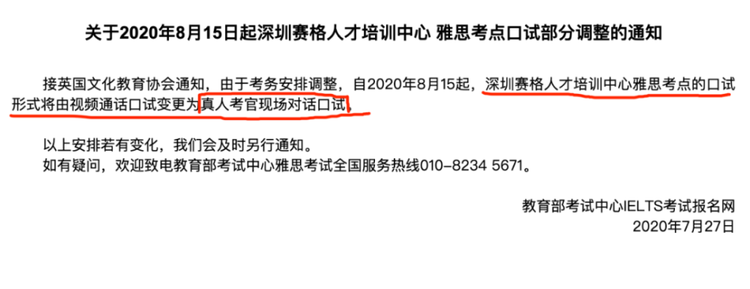在雅思冲刺阶段,考生除了常规训练之外,更应该要归纳错误,以防下次再犯。下面小编就和大家分享雅思口语冲刺6个雅思注意事项,欢迎阅读!
雅思口语冲刺6个雅思注意事项
雅思口语注意事项 1,一定要口语话。
其实口语就是交流,总说些平时说不到的东西和词汇的话,总会给考官一种应试的感觉,往往拿不到高分,最多也就是 6.5分左右。但是也不能抓着哪个词很用,那就又出现了用词贫乏的弊端。
雅思口语注意事项 2,尽量用第一人称交流。
考试的时候,考官最想听到的是你个人的独到见解,所以尽量说你的感受,就用主语“I”就足够了。一般来说,你自己只能代表你个人的观点,所以说到他人的想法的时候,要注意用词。
雅思口语注意事项 3,回答要具象。
所以具象也就是说要具体,不要总谈些大道理,道理谁都懂不少,但是每个人的经历往往是唯一的。特别是口语第 2部分,希望考生能把卡片表达的越具体越生动。
雅思口语注意事项 4,注意性别问题。
这个看似简单,但是对于中国考生来说,在相当程度上是一个很大的问题。所以建议考生,如果真的怕把性别“he”或“she”说颠倒的话,就练习下平时说男的多,还是说女的多,要是平时就总是说“he”的话,那考试的时候就把你准备的涉及到人物的资料,都尽量用“he”来表达就 OK了。
雅思口语注意事项 5,尽早点题。
对于老外来讲,基本都是直来直去的,他们不喜欢拐弯抹角。所以期望考生能在前2 句话里,做到很到位的点题,也就是平时说的中心句或者论点。这对于口语考试第 2部分尤其重要,不要刷小聪明,想给考官一点猜测的空间,但是考官是吃这碗饭的,所以还是诚恳点的好。
雅思口语注意事项6,分点讨论。
这里说的分点是分层次去表达,千万不要想到什么说什么,特别是第 3部分的深入讨论部分。想要做到分层讨论,就需要考生具备一定的生活和社会常识性问题的了解,只有这样才能很好的避免说着说着没话可说的窘境。
2020年9-12月雅思口语part2&3答案解析:你获奖的经历
Describe a time when you won a prize.
You should say:
When it happened
What prize it was
Why you wanted to win that prize
And explain how you felt about that experience
The time I remember really clearly when I won a prize was when I was in school in a singing contest. It was an annual event, I think before Spring Festival… There was a big end-of-year stage performance at school, and in teams or individually, we were encouraged to join a singing or music competition. I decided to do a solo, because I’m really into singing and I’m really good at it. I had singing lessons since I was a kid and I’m a huge fan of performing cover versions of songs and going to KTV and really trying to sing better and better, and more challenging things. I decided that I would sing a song by Adele, called Chasing Pavements, which I find a little bit difficult, actually. I practiced intensely for at least a month, at home and also during rehearsals with a microphone and the proper sound equipment that we would use in the contest. When the big day came I was obviously really, really nervous. I dressed in a shiny metallic long dress and did my hair in wavy sort of curls and wore a silver necklace, so I felt really elegant as I got up on stage, and I think this helped me feel more confident. I thought I sang particularly well on this occasion and I felt really empowered singing in from of hundreds of people and seeing their faces of admiration as I hit some of the high notes spot on. I did make a couple of mistakes, which I was disappointed about, but in the end when the judges all gave their results, I came first!! Yes, I won first prize! I was amazed. I knew I had performed pretty well, but I didn’t think I was the best or that I’d win first prize. I was so proud of myself, and after the show I went for a meal with my parents and a couple of my friends to celebrate. Oh, I forgot to say what the first prize was!! I was presented, on stage, by the judges, with a large gold trophy in the shape of a musical note, and an android tablet. That was first prize. I was really pleased with that, but to be honest, I was more pleased with coming first and achieving such a great thing, than the actual prize gift for the achievement, if that makes sense.
Part3
1. What kind of prizes do children often win nowadays?
I’m not totally sure really. I think it depends on the kind of competition. I think most prizes are quite modest, like trophies for sporting or musical achievements, and perhaps things that are useful for studies like pens and books and electronics. Depending on the school and the area, the prizes can be quite expensive, or quite simple. I think children today are becoming far too spoilt and they are getting increasingly demanding, expecting really expensive prizes and gifts and I think this isn’t really a good trend. So, I imagine there is some pressure for prizes to be more fancy than they were in the past. This seems to be what’s happening these days in other spheres of life anyway – like big company galas and events like this, the prizes can be anything from the latest mobile phone to even a car!! I think the whole culture of prizes and rewards is a little bit unpleasant really, and since I was a kid things have become far too materialistic.
2. Are these prizes good for them?
I think, as I was saying before, prizes that are useful and practical are good for them, and prizes such as trophies are motivating too. But I think prizes that are just expensive items for the sake of it, or fancy brands, and things like this, simply encourage a culture of consumerism and materialism. I worry today that too many people in my country, especially younger people and children, put too much emphasis on brands and fancy gifts and expensive things, and not enough attention is given to modest forms of encouragement and moral values. So, I think that some prizes are not good for them and force a kind of competition that I do not think is healthy.
3. Why do we need to give children prizes?
Prizes can be motivating and encouraging so I think that if done in the right way, giving children prizes can reward effort and success and motivate children to try to do better in their studies, sporting activities, musical pursuits or other activities. There should always be a culture of healthy competition in life, and the values of being a good loser should be encouraged as much as those of being a good winner! Children should not have too many prizes too often, but on special occasions or when they have achieved something really worthwhile through personal dedication and effort, then children should be rewarded with prizes and this can be motivating and encouraging.
2020年9-12月雅思口语part2&3答案解析:忘记做的事
Describe a thing you once forgot to do.
You should say:
What it is
When you forgot it
Why you forgot it
And explain how you felt about this experience
I’m sometimes quiet a forgetful person so in fact there are quite a few occasions I recall when I forgot to do something. You see, I can get a bit flustered and stressed out under pressure and it’s on these occasions that I am most likely to forget something. It’s never something really important, though, at least not usually. The one time that I did forget something important was when I was meant to take a birthday present to my brother’s house in Changsha. You see, we were making a family visit there for his birthday and we prepared lots of stuff to take to him. I completely forgot his present, to be honest I don’t know how I could have forgotten it but I did. I got into an argument with my mother you see, a silly argument about something unimportant, just before we were about to leave for the train station, and I completely forgot the present – I left it on the kitchen table at home. I was meant to pack it but I didn’t. I didn’t actually realise that I’d forgotten it until we arrived at his house after the long train journey, and then everyone unpacked their stuff, and I suddenly realized I didn’t have it. I was incredibly embarrassed and felt really silly. He wasn’t that annoyed about it, but I felt bad and my mother was really angry and gave me a lot of hassle about it. She has gotten quite tired, over the years, with reminding me to do things, and me forgetting you see. So, this was one of the many occasions when I’d forgotten something, yet again, and she lost patience with me. My brother calmed her down – he’s quite a placid character and he is good at smoothing things over – he never seems to get annoyed or take anything too personally, unlike my mother, so he was totally cool about it all. But, still, I felt bad and I said I would post it to him from Beijing, when we got back. This was a year ago, summer last year. In fact, it was during the summer holidays from university.
Part3
1. How can we strengthen our memory?
There are a number of ways we can strengthen our memory, actually, most of these include mental activities like puzzles, word games, number games and, of course, reading. Reading novels is very underestimated as a great form of keeping the mind active and sharp – mainly because you’ve got to hold in your mind different characters and what they do. I think that is why kids learn and remember things more than adults sometimes – they’re in school and have to read a lot of different things for different subjects so they are constantly training their minds in that way, and at the same time training their memories. In school here you have to memorize a lot you see so some people get really strong at memory-related activities and things. After we leave school I think we lose some of this ability, but that also depends on the kind of jobs we do. If you have a challenging and demanding job juggling lots of different tasks, projects and deadlines, then you’re more likely to keep your memory sharp and focused. If you have a more laid-back job you’re more likely to get out of the habit of remembering things or managing multiple tasks at once and you’re perhaps more inclined to forgetting things easier.
2. What kind of people might easily forget things?
People who are busy or easily distracted forget things more, I reckon. Also, it’s a personality thing: some people are more absent-minded and it’s just in their nature. Also, people who get stressed more easily, and confused can forget things more often than people who are calm and composed. When you get worried and stressed your mind can get clouded and you’re more likely to put things off or forget to do things, because your mind is occupied and not really working in a clear or organized manner. Also, if you’re tired you’re more likely to suffer from absent-mindedness. It’s important to get a good night’s sleep because that helps the brain to be more clear and focused.
3. What kind of things do people often forget?
People forget dates, times and appointments sometimes. I’m not sure, I think it depends… let me think… I have friends that often forget their subway card in the office, or forget their phone even in the bathrooms at work. There are all sorts of things like this that people routinely forget. My sister always leaves her car keys in bars and restaurants – almost every time she goes out, we are just leaving the place and she must go back to get her keys from the table we’ve been eating at. I don’t know why she always does this. You see, different people have different habits, both good and bad habits, and some people forget these kind of items because they get distracted in conversation and then absent-minded about their wallet or keys or these kind of things that you take out of your pocket and put down, then forget to pick up again.
4. Do you think heavy workload is the reason for forgetting things?
Yes, oftentimes this can be a reason why people forget things, most certainly. If people have a lot of work to do they not only have to juggle a lot of different tasks and projects, maybe, but they also might not get chance to have proper rest and sleep, especially if they also have family responsibilities and duties when they get home at night. So, this can cause people to be tired, which, in turn, means that their minds aren’t working properly or very sharply, and they can easily forget things. I think that a good work-life balance is essential for people. In fact, people are more likely to produce better quality work and not get forgetful, if they have plenty of rest time and a decent night’s sleep that is largely free of stress or worry.
雅思相关文章:
★ 雅思8分英文自我介绍精选5篇
★ 8.22雅思考试真题回忆及答案参考
★ 雅思自我介绍高分范文
★ 2020年雅思口语题库汇总新题
★ 励志故事读书心得大全600字6篇
★ 疫情期间大学生实践报告2500字模板大全
★ 学院学生就业年度工作计划样本2020
★ 夏令营实践主题活动策划方案范文
雅思口语冲刺注意事项
上一篇:提高雅思口语方法2020
下一篇:返回列表






